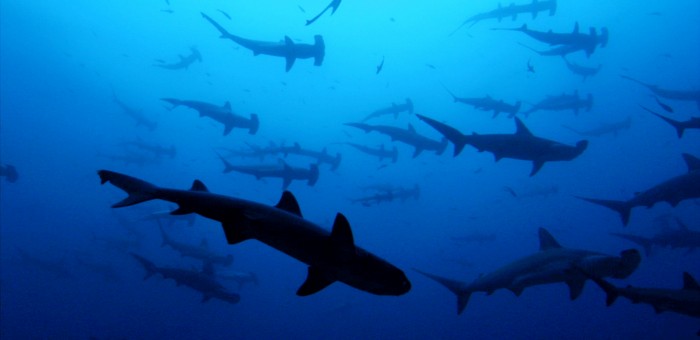Community Blog
Banning the sale of shark fins: Over to the Minister
Last week the Minister of Agriculture committed to meeting with me to discuss how the province of British Columbia could end the sale, trade and distribution of shark fins in British Columbia. On Monday of this week we met. At the meeting I promised to put together a package of information that he committed to pass along to Ministry staff for a thorough review.
I am pleased to report that I presented the Minister with a binder containing detailed and comprehensive information outlining the rationale for implementing legislation to ban the sale, trade and distribution of shark fins in British Columbia. Below I reproduce the letter and the table describing the information contained in the binder.
Please note that the information in Tab 10 is especially pertinent to British Columbia. BC has a highly regarded and sustainable spiny dogfish industry. BC legislation could include a specific exemption for spiny and smooth dogfish that are lawfully caught by a licensed fisher.
I am very grateful to Margaret McCullough and the GNS Fin Free Students, Julia Baum at the University of Victoria, Nicholas Dulvy at Simon Fraser University, Gabriel Wildgen at Humane Society International/Canada, and Nicholas Wright at Wright Business Law in Toronto for their assistance and/or advice as I put together this package.
Letter to the Minister
Dear Minister Letnick,
I very much appreciated you agreeing to meet with me on Monday, November 24 to further discuss the question I posed to you in the legislature on Thursday, November 20. As you will recall, I asked whether or not the Province would consider introducing legislation to ban the sale, trade and distribution of shark fins in British Columbia.
In the meeting, I agreed to provide you with a package of information that you committed to passing along to Ministry staff for a thorough review. Please find attached a binder containing such information.
The binder is separated into fifteen sections whose contents are summarized below.
Thank you again for taking the time to meet with me to discuss this important issue. I very much look forward to your further correspondence.
Yours sincerely
Andrew Weaver
MLA Oak Bay Gordon Head
Summary of Binder Contents
Tab |
Contents |
Description of Contents |
| 1 | Summary Letter | Copy of this letter |
| 2 | Legal Opinion | Legal opinion provided by Nicholas Wright, Barrister & Solicitor, to Humane Society International/Canada. The opinion states: “British Columbia has the authority to ban the sale, trade and distribution of shark fins through constitutional provisions pursuant to section 92(13) and section 92(16) of our constitution.” |
| 3 | Scientific Studies | Four key scientific papers are included.1) Worm et al., 2013: Global catches, exploitation rates, and rebuilding options for sharks. Marine Policy, 40, 194-204.I quoted from this study in Question Period. In this study, Worm and his colleagues produced three independent estimates of the average rate that sharks are killed per year. These estimates ranged between 6.4% and 7.9%, all exceeding 4.9% per year — the amount needed to keep populations stable.2) Dulvy et al., 2014: Extinction risk and conservation of the world’s sharks and ray. eLIFE: eLife 2014;3:e00590. http://dx.doi.org/10.7554/eLife.00590.001Dulvy (from SFU) and his colleagues examined the extinction threat of 1,041 species of sharks and rays. One quarter of all of these species, particularly larger species in shallow waters that are harvested in the finning industry, are threatened with extinction. Only 37.4% of all species are considered safe.
3) Ferretti et al., 2010: Patterns and ecosystem consequences of shark declines in the ocean. Ecology Letters, 13, 1055-1071. Ferretti and colleagues examined the effects that declining populations of large sharks have had on marine biodiversity. They found that human predation of these large sharks has had a significant effect on marine communities of other species. 4) Clarke et al., 2012: Population trends in Pacific oceanic sharks and utility of regulations on shark finning. Conservation Biology, 27, 197–209. Clarke and colleagues found declining shark populations in the Pacific Ocean and noted “targeted fishing for sharks in some regional fisheries heighten concerns for sustainable utilization”. |
| 4 | Media – Global | Several examples of media coverage from around the world on the topic of shark finning. |
| 5 | Media – US | Several examples of US media coverage of shark finning. Delaware, Hawaii, Illinois, Maryland, Massachusetts, New York, as well as California, Oregon, and Washington have all banned the sale of shark fins. |
| 6 | Media – Canada | Two examples from Canadian media coverage of shark finning. |
| 7 | Media – BC | A few examples from BC media coverage of shark finning. Of particular note is the article pointing out the success of the UBCM resolution as well as the CTV news article that points out that fins from sharks that are now on the UN CITES list (tab 14) were found for sale in Vancouver. |
| 8 | Weaver blog | Copies of all blog posts on my website: AndrewWeaverMLA.ca that concern shark finning. |
| 9 | Global legislation | A list of jurisdictions around the world that have regulations on shark finning. |
| 10 | BC Dogfish + US Legislation | Information concerning the well-managed, sustainable, British Columbia spiny dogfish industry.In addition, I have included sample legislation from New York State. New York also has a sustainable dogfish industry. They included a specific exemption for spiny and smooth dogfish that were lawfully caught by a licensed fisher. |
| 11 | BC Municipal Legislation | Information concerning municipal legislation in North Vancouver and Port Moody where shark fin possession, sale, trade and distribution bans have been passed. |
| 12 | Polling info | Polling results from March 2013 conducted by Environics Research Group for Humane Society International – Canada. The poll indicates only 13% of Canadians oppose a ban on importing shark fins to Canada. |
| 13 | IUCN SSG Position | Position statement of the United Nations International Union for the Conservation of Nature (IUCN) Shark Specialist Group (SSG) on shark finning. Note that Dr. Nicholas Dulvy, co-chair of the IUCN SSG, is a Canada Research Chair in Marine Biodiversity and Conservation at Simon Fraser University.The position statement notes: “shark finning …threatens many shark stocks, the stability of marine ecosystems, sustainable traditional fisheries, food security and socio-economically important recreational fisheries.” |
| 14 | UN CITES | Copy of the United Nations Convention on International Trade in Endangered Species of Wild Fauna and Flora together with its appendices. The list includes five orders in subclass Elasmobranchii (sharks). The five orders are: Carcharhiniformes (Ground Sharks), Lamniformes (Mackerel Sharks), Orectolobiformes (carpet sharks), Pristiformes (swordfish) and Rajiformes (skates). |
| 15 | CITES Parties | List of Parties to the Convention on International Trade in Endangered Species of Wild Fauna and Flora indicating that Canada ratified the agreement on April 10, 1975. |
|
“5Media” is not one of the 4 million topics at Answers.com.Would you like to search the web?
Copyright © 2014 Answers Corporation. All rights reserved. |
Seniors Advocate Seeking Applicants for Council of Advisers
The Office of the Seniors Advocate is seeking applicants to set up a council of advisers and interested seniors are invited to apply.
The council will be made up of seniors from around the province, who will bring their diverse experience and perspective on seniors issues. It will bring forward issues and concerns and will review projects, reports and recommendations developed by the Office of the Seniors Advocate. The council will meet four times per year, by phone or in person.
There will be 25-30 council members appointed and terms will initially be from one to three years.
Seniors who would like to serve on the council must submit their applications by December 18, 2014.
The Office of the Seniors Advocate has collaborated with the Council of Senior Citizens’ Organizations of BC (“COSCO”) to develop selection criteria. COSCO is an umbrella organization made up of seniors’ organizations and individuals from every area of BC.
Interested seniors can also get more information by phone at 1-877-952-3181 (250-952-3181 in Victoria) or by email at info@seniorsadvocatebc.ca
More information about the Council of Senior Citizens’ Organizations of BC can be found on their website.
Legislative Assembly of B.C. 2015 Summer Tour Program
Applications are now being accepted for the Legislative Assembly of British Columbia’s Summer Tour Guide Program. Each year, post-secondary students from across Canada are invited to participate in the program as Tour Guides and Parliamentary Players, bringing parliamentary procedure and British Columbian history to life for many students and visitors.
Summer Tour Guides present tours that interpret British Columbia’s political history, legislative process, and the art and architecture of the Parliament Buildings. Applicants must be enrolled at an accredited post-secondary institution with public speaking experience and the ability to communicate fluently in English and a second language.
Parliamentary Players shine a light on important historical characters and events that helped to define our province. Dressed in period costumes, the Parliamentary Players appear on tours and deliver lively, historically accurate monologues. Applicants must be enrolled at an accredited post-secondary institution with theatrical experience and be able to convincingly portray historical characters and creatively ad-lib with visitors.
For more information about the program or to apply to be a Summer Tour Guide or Parliamentary Player, please click here.
Working Towards a Ban on Shark Fin Sales – Next Steps
Today I met with the Honourable Norm Letnick, Minister of Agriculture, as a follow-up to the question I raised in the Legislature last week as to whether or not the province would be prepared to introduce legislation to ban the sale, trade and distribution of shark fins in British Columbia.
It was a very fruitful meeting and the Minister tasked me with putting together a package of information that he would commit to passing along to Ministry staff for a thorough review. The review is to be evidence-based, which is precisely what I had hoped for.
I have already tabled a legal opinion that concludes that the provincial government has the power to ban the sale, trade and distribution of shark fins in B.C. At this stage, the information that I plan to put together is as follows:
- Annotated bibliography (with original papers) revealing the plight of global shark populations;
- List of jurisdictions worldwide that have banned the sale, trade and distribution of shark fins in British Columbia;
- Relevant media clippings from British Columbia, Washington, Oregon, California and other jurisdictions concerning the process and subsequent public reaction to the banning of the sale, trade and distribution of shark fins;
- Evidence concerning internationally protected shark species.
While I have been following this issue for a few years, I recognize that there are many in the community who have far greater knowledge on this topic than I do, including internationally-renown scientist, Dr. Julia Baum, at the University of Victoria. Should you have relevant information in any of these areas, I would be delighted if you would please share it with me by emailing me at: Andrew.Weaver.MLA@leg.bc.ca
My goal is to get a complete package to the Minister by the end of the week.
Header Photo Credit: Rob Stewart, Director, Sharkwater.
Celebrating Glenlyon-Norfolk School and Fin Free Victoria
Honourable Speaker, today I’d like to speak to you about the importance of the youth voice in our society.
 And I’d like to illustrate this by focusing specifically on the efforts of a remarkable group of students from Glenlyon-Norfolk School who are being featured in an upcoming documentary entitled Child of Nature, produced by Enigma Films under contract from Warner Brothers.
And I’d like to illustrate this by focusing specifically on the efforts of a remarkable group of students from Glenlyon-Norfolk School who are being featured in an upcoming documentary entitled Child of Nature, produced by Enigma Films under contract from Warner Brothers.
Madame Speaker, sharks have been present in our oceans for over 400 million years. They have survived the Earth’s five great extinction events including times when up to 80% of all marine species were wiped out. But they are struggling now in the anthropocene, the 6th great extinction event, because of a cruel and wasteful process known as shark finning.
In February 2012, Rob Stewart, Director of the film Sharkwater gave a powerful presentation to Glenlyon-Norfolk School. He inspired and motivated the students in the room. They became determined to do what they could to make people aware of the plight of the world’s shark population.
 Together with their teacher, Mrs. Margaret McCullough, these students set up a not for profit known as Fin Free Victoria.
Together with their teacher, Mrs. Margaret McCullough, these students set up a not for profit known as Fin Free Victoria.
Madame speaker, this incredibly passionate and articulate group of young students has worked tirelessly for several years.
They’ve visited numerous municipalities and businesses in Victoria, Vancouver, Richmond and elsewhere on Vancouver Island. They’ve given presentations to restaurant groups; they’ve collected signatures on petitions; they’ve conducted media interviews; they’ve participated in press conferences; they’ve met with many municipal councillors as well as provincial and federal politicians.
And at all times, they’ve done so with deepest respect for, and sensitivity of, British Columbia’s diversified cultural heritage.
Madame Speaker, this group of young students, has been so effective that shark fin soup has disappeared from the menus of all Victoria restaurants. Fin-Free stickers are proudly displayed instead. The same is true for a growing number of establishments in Richmond and Vancouver, thanks in part to the collaborative efforts of Fin Free Victoria.
Honourable speaker, it gives me hope and inspiration to see the youth of today so engaged in such important societal issues.
While we in this room ultimately represent the decision-making generation, it is their generation that will have to live the consequences of our decisions.
Each and every one of us should reflect upon that from time to time.









